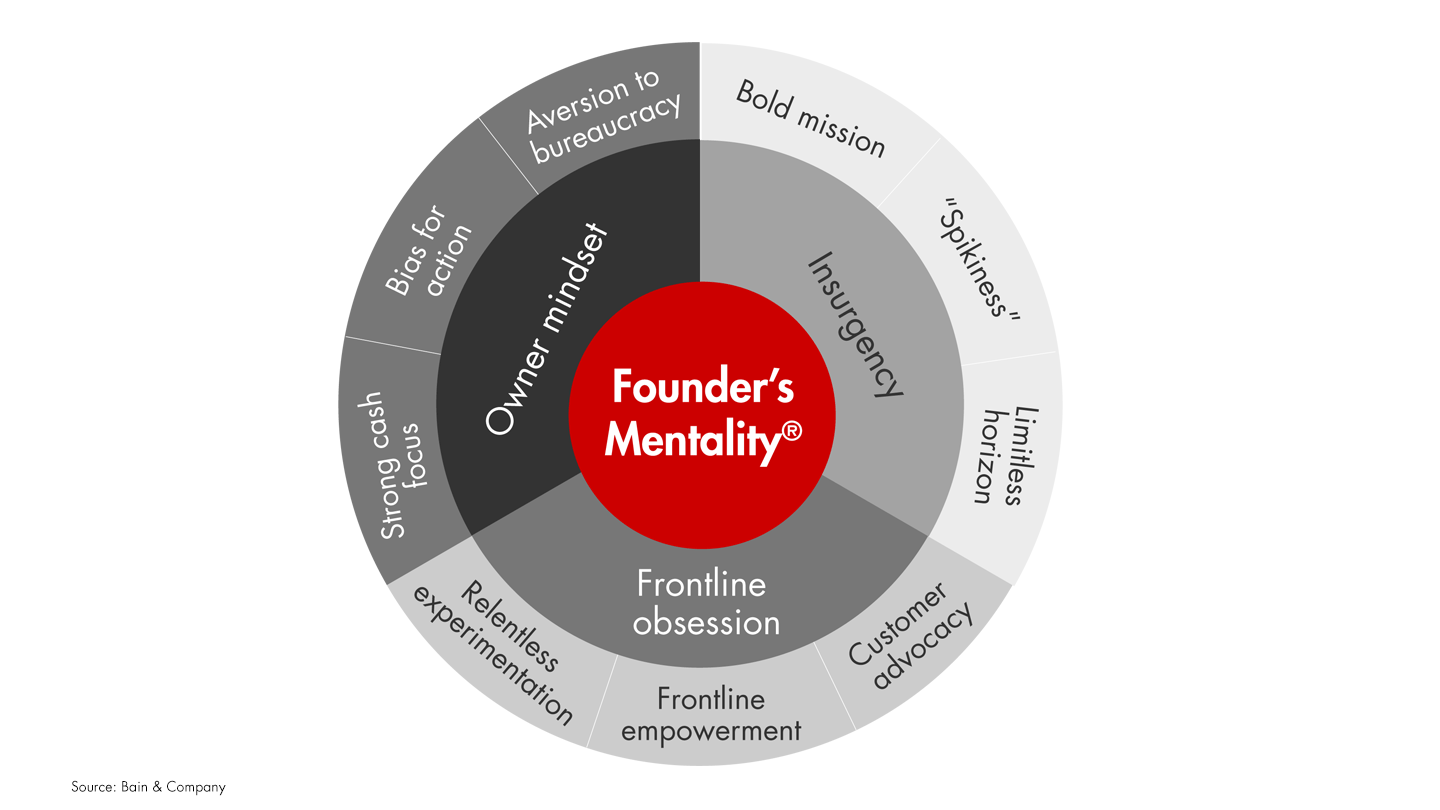Founder's Mentality Blog
Celebrating the heroes in your company who fight bureaucracy every day is essential to maintaining Founder’s Mentality. Let's examine the aversion to bureaucracy.
There’s a risk that the various elements I’ve described in previous posts can somehow be seen as ultimately always leading back to CEOs and the actions they take to retain Founder’s Mentality. But while the CEO is critical, we know that the CEO’s actions alone will not sustain the Founder’s Mentality.
Founder’s Mentality is an extraordinary sense of insurgency, a frontline obsession and an owner mindset, and each of these characteristics has important sub-elements (see Figure 1). No CEO can maintain these characteristics on his or her own—they must permeate the company, from the front line to the back office to the executive suite.


The third of those elements, owner mindset, might seem at first glance to have more to do with the CEO and the leadership than, say, frontline obsession, but that’s not the case. The owner mindset must be shared throughout the company. It provides some of the most important antibodies to complexity, creating a culture that ruthlessly cuts costs and complexity and acts to overcome and destroy bureaucracy whenever it rears its head.
An owner mindset includes three elements:
- A strong cash focus: Leaders are obsessed with the cash generated by the business, which demands they constantly monitor the gross margin of the business and the SG&A line.
- A bias for action and speed: Leaders of insurgent companies welcome conflict—if quickly resolved—as a path to the best outcomes for the company and its customers. They won’t tolerate anyone using conflict as an excuse for inaction.
- An aversion to bureaucracy: Systems, processes and procedures become increasingly necessary as a company grows, but insurgent leaders seek to balance that need for professionalization by making heroes of those individuals who don’t hesitate to buck the systems if it means doing the right thing for the customer. Leaders accept the occasional chaos that may result as the cost of maintaining that balance.

About the Founder's Mentality
The three elements of the Founder's Mentality help companies sustain performance while avoiding the inevitable crises of growth.
Let’s examine what an aversion to bureaucracy looks like.
The reason insurgents are such formidable competitors is that all employees are seen to be fighting the good fight, doing whatever it takes to serve customers. This starts, as we did in this latest blog series, with a bold mission. But it also demands that everyone feels empowered to do what it takes, to fight internal and external obstacles to achieve that mission.
This leads to the story of Dmitri at Niko Group. In a recent post, we told the story of Niko Group, a Belgian electrical parts supplier that needed to get a new product to the market rapidly. A key supplier for one product component—waterproof seals—failed to deliver as scheduled, but missing the product launch deadline was not an option.
Here’s Niko’s CEO telling Dmitri’s story:
“The deadline came closer and closer, but no seals arrived. Close to his final deadline, Dimitri called again to find out where his seals were. The supplier simply replied that the cartons of seals were ready and waiting, but they did not have the time to ship. They would ship at their convenience. When Dimitri answered that he would get in the car and come over to pick them up, they started laughing: Niko is in Sint-Niklaas, Belgium, and the supplier was in Frankfurt am Main—an 850-kilometer round trip. They stopped laughing when Dimitri arrived at their doorstep four hours later to pick up the Niko seals.
“Dimitri got back at the factory that same evening, and by the next morning, we were producing new splash-proof boxes with new seals. Dimitri pulled out all the stops to deliver: This was the spirit that first made the company the market leader in that particular segment, but you also need that same spirit to maintain that position and to build on it. Had Dimitri not gone the extra mile, it would have been open hunting season for all competitors.”
We’ve collected dozens of Dmitri stories—stories about the heroes who do what it takes to overcome bureaucratic obstacles on behalf of customers. Almost all great companies are built on these heroics. The danger is that, over time, the emphasis shifts to protecting the systems in your company, the processes, the institutional “ways of working.” People who sometimes fight against these systems are seen not as heroes, but as troublemakers.
This is a big risk, because only bureaucrats want to work in a company where systems rule absolutely. Bureaucracies bring order and predictability, but are sometimes indifferent to the rights and wrongs their efficiency creates. As a leader, your job is to risk the unhappiness of these bureaucrats by seeking out and celebrating the actions of those who fight against systems and procedures to do the right thing for customers. There is no better single action you can take to bring back Founder’s Mentality than to create a cadre of heroes fighting for right at the expense of order. It is chaotic, but all great adventures are.